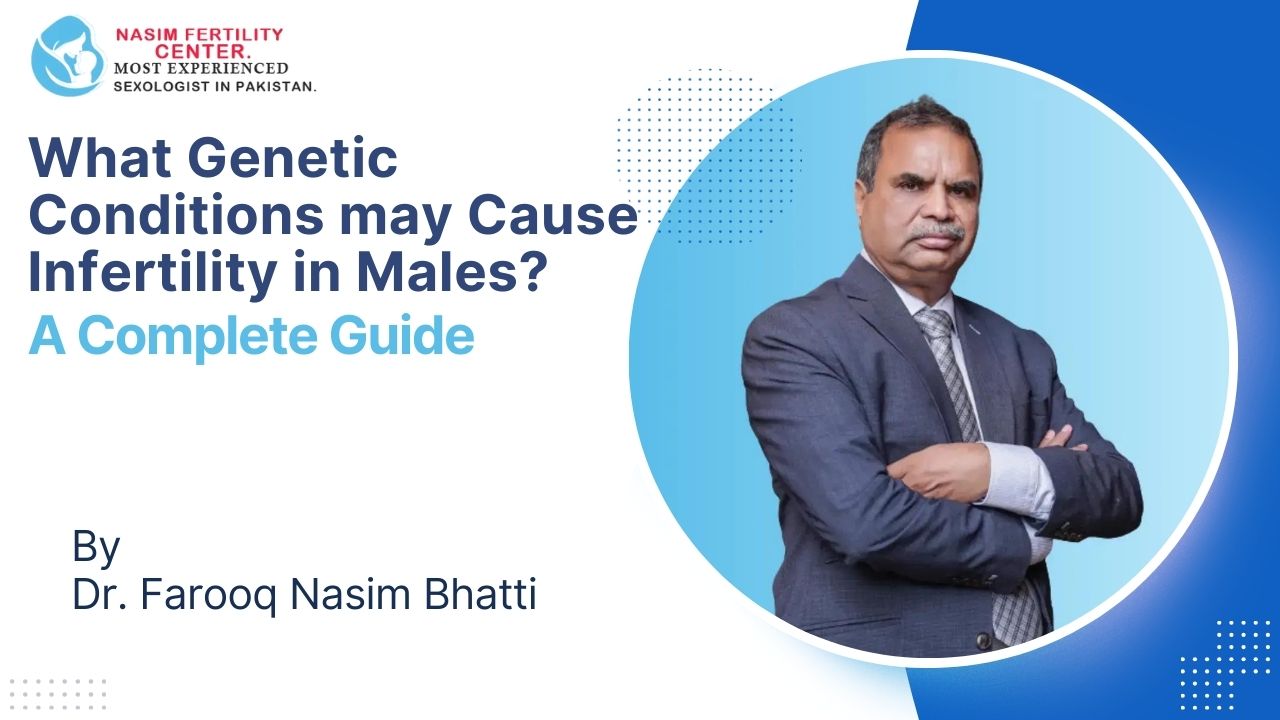
In recent years, discussions surrounding male infertility have gained critical importance in Pakistan, where societal pressures and cultural expectations often place immense stress on couples seeking to conceive. While various factors contribute to infertility, genetic disorders remain a significant yet often overlooked cause.
Understanding the link between genetic abnormalities and male infertility is essential not only from a medical standpoint but also to foster awareness and empathy within families and society at large. As we delve deeper into this subject, we focus on the insights of Dr. Farooq Nasim Bhatti MBBS, Diplomate of the American board of Sexology (USA), FAACS (USA), a renowned sexologist and IUI treatment expert with 30 years of experience, who operates clinics in Lahore, Islamabad, and Faisalabad, and also offers online consultations to cater to the diverse needs of his patients.
This article aims to shed light on how genetic disorders impact male fertility, the importance of genetic testing, and the role of healthcare professionals in addressing these challenges in the Pakistani context.
When Genetic Testing is Recommended
Genetic testing is a crucial step for couples facing challenges in conceiving, especially in cases where male infertility is suspected. In Pakistan, where traditional beliefs often influence healthcare decisions, it is vital to emphasize when genetic testing should be recommended.
- Semen Analysis Results: If a man’s semen analysis reveals deficiencies such as low sperm count, poor sperm quality, or lack of sperm altogether (azoospermia), genetic testing becomes essential. This analysis serves as the first step and lays the groundwork for further investigations.
- Multiple Miscarriages: Couples who have experienced several miscarriages should consider genetic testing to rule out any underlying genetic issues that might be contributing to fertility problems. In such cases, both partners may need to undergo testing to understand the genetic factors at play.
- Physical Anomalies: Certain physical abnormalities, such as the absence of the vas deferens or reduced testicular size, can indicate a genetic predisposition to infertility. Assessing these conditions through genetic testing can provide crucial insights.
- Severe Azoospermia or Oligospermia: Men diagnosed with severe conditions such as azoospermia (absence of sperm) or significant oligospermia (very low sperm count) are at a higher risk of having underlying genetic abnormalities. Genetic testing can help identify these issues early and guide treatment options effectively.
- Cultural Context: Emphasizing the importance of genetic testing in the Pakistani culture can help reduce stigma and promote a proactive approach to male infertility. Awareness campaigns led by healthcare professionals can encourage couples to seek testing without the fear of societal judgment.
Kya aap beoladi (infertility) ka samna kar rahe hain?
Consult karein Dr. Farooq Nasim Bhatti – Pakistan ke leading male infertility specialist. Advanced testing aur confidential treatment ke zariye apni family ki umeed ko haqeeqat banayein.

Specific Genetic Disorders Affecting Male Fertility
When discussing genetic disorders that can affect male fertility, it is essential to consider their impact on Pakistani men and the societal context surrounding these conditions. The following genetic disorders are particularly significant:
- Klinefelter Syndrome: This condition occurs when a male has an extra X chromosome (47,XXY). It affects approximately 1 in 1,000 males and is a common cause of infertility. Men with Klinefelter syndrome often exhibit reduced testosterone levels, leading to symptoms such as decreased testicular size, gynecomastia (breast tissue development), low libido, and infertility. In Pakistani society, where traditional views often associate masculinity with fertility, those affected may face significant emotional and social challenges.
- Cystic Fibrosis Gene Mutations: While cystic fibrosis (CF) is often associated with severe respiratory issues, CFTR gene mutations can also lead to male infertility due to the absence of the vas deferens (CBAVD). Men with these mutations may be asymptomatic regarding cystic fibrosis, yet face infertility challenges. Genetic counseling is crucial here, as families may be concerned about potential implications for future children, particularly in culturally rich environments like Pakistan.
- Y Chromosome Microdeletions: This condition refers to missing genetic material on the Y chromosome, which can significantly impair sperm production. Men with azoospermia or severe oligospermia have a substantially higher risk of this genetic issue, which can lead to inherited infertility. With many Pakistani families valuing male offspring, understanding this disorder can be vital for family planning and addressing emotional concerns about infertility.
- Chromosomal Translocations: These chromosomal abnormalities can cause difficulties in sperm production and contribute to infertility. Affected men may present with low sperm counts and may be unaware of their genetic status until evaluated. The cultural stigma surrounding infertility in Pakistan can put additional pressure on these individuals, making awareness of such translocations even more critical.
- Noonan Syndrome: This genetic disorder can present with a range of symptoms, including cardiovascular issues and characteristic facial features. In males, undescended testicles are common, increasing the likelihood of infertility. Despite social advancements, discussions about genetic disorders can still be taboo in some Pakistani circles, highlighting the need for sensitive education and public discourse.
By raising awareness about these conditions, we can enhance understanding and support for those affected among the Pakistani population, paving the way for more compassionate approaches to male infertility and genetic counseling.
Genetic Testing for Male Infertility
Genetic testing plays a pivotal role in addressing male infertility in Pakistan, where cultural nuances often shape healthcare decisions. In cases of suspected infertility, several key genetic tests are recommended:
- Karyotype Analysis: This test evaluates the number and structure of chromosomes within a man’s cells. It can detect chromosomal abnormalities that could be contributing to infertility. For Pakistani men with a history of infertility, karyotype analysis provides critical insight and can assist clinicians in recommending appropriate treatment options.
- Cystic Fibrosis Gene Testing: Given the potential for CFTR gene mutations to lead to infertility, this test is essential for men with absent vas deferens or unexplained infertility. Particularly in regions like Pakistan, where family planning can be a sensitive topic, understanding these genetic factors empowers couples in their reproductive choices.
- Y Chromosome Microdeletion Testing: Evaluating for microdeletions on the Y chromosome is crucial for men diagnosed with azoospermia or low sperm count. This testing helps determine the likelihood of inherited infertility, which is particularly important for families aiming for male offspring, common in Pakistani culture.
- Broader Genetic Counseling: Beyond testing, genetic counseling must accompany the testing process. Consulting a geneticist can help interpret results and guide couples through the implications on family planning, especially considering the traditional views on male fertility in Pakistan. Accessing genetic counseling and testing facilitates informed decisions, reducing stigma around male infertility and fostering a supportive environment for affected couples.
By prioritizing genetic testing, Pakistani men facing infertility can gain valuable knowledge about their reproductive health, allowing them to make informed choices and seek targeted treatments. A proactive approach to genetic disorders can also change societal perceptions, making it easier for men and their partners to navigate infertility challenges together.
Conclusion
Addressing male infertility treatments in Pakistan through the lens of genetic disorders is paramount in creating a more empathetic and informed society.
As stigma surrounding infertility diminishes through education and open discussions, it becomes crucial for couples struggling with these challenges to seek help and support from experts like Dr. Farooq Nasim Bhatti. With 30 years of experience in the field of sexology and assisted reproductive techniques, Dr. Farooq Nasim Bhatti MBBS, DABS (USA), FAACS (USA), not only offers advanced treatment options but also provides valuable insights into the implications of genetic disorders on male fertility. His clinics across Lahore, Islamabad, and Faisalabad, along with online consultations, ensure that individuals and couples have access to the care they need regardless of their location.
By fostering awareness about genetic factors affecting male infertility and promoting genetic counseling, we can empower Pakistani men and women to make informed decisions about their reproductive health. Together, we can cultivate a society that embraces knowledge and compassion in the face of fertility challenges, ultimately supporting families in their journey toward parenthood.

Dr. Farooq Nasim Bhatti (MBBS, FAACS – USA, Diplomate: American Board of Sexology, CST, HSC – Hong Kong, CART – Malaysia & China) is a qualified medical sexologist with 30+ years of experience. He has presented 21+ research papers internationally and treats sexual dysfunction through sex therapy, counseling, and pharmacotherapy to restore natural sexual function without temporary medication.

Regain Confidence with Our ED Solutions
Explore effective treatments for erectile dysfunction. Take charge of your intimacy today.


